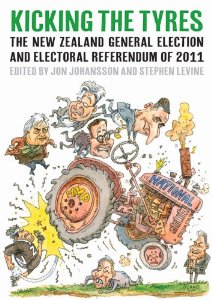
The Edge of Reason: Kicking the Tyres
- Graeme Edgeler
- 1
- Posted on
 A few weeks back, I attended the Karori Normal School Gala, at which I bought a copy of the most recent VUP post-election book Kicking the Tyres: The New Zealand General Election and Electoral Referendum of 2011 edited by Jon Johansson and Stephen Levine. I’m pretty sure it was entirely unread (and the DVD was still in the back). Well, not any more.
A few weeks back, I attended the Karori Normal School Gala, at which I bought a copy of the most recent VUP post-election book Kicking the Tyres: The New Zealand General Election and Electoral Referendum of 2011 edited by Jon Johansson and Stephen Levine. I’m pretty sure it was entirely unread (and the DVD was still in the back). Well, not any more.
In the opening chapter, the two editors, setting the scene for the election, observe:
… The normal pattern in New Zealand is that governments (and prime ministers) begin to lose support during their first term, win a second term with reduced support, and change places with the opposition at the subsequent election. This pattern of voter disenchantment and electoral attrition was especially common during the first-past-the-post (FPP) two-party era…
Now, you may guess that I’m about to list all the governments we have ever had, adding up those for whom this is true, and those for whom it is not, and then claiming that as it has happened less than half the time, it can’t be described as “normal”. And – if this was a recent book – I might have, as I’m not a fan of that sort of hyperbole, especially in scholarly writing. But I’m not going to expend your time on a fact-check of a book released over a year ago on that basis: this is not a claim that falls down on a ‘technicality’.
There are really two claims here. First, about the normal pattern of elections in New Zealand, and second, a claim that the normal pattern was especially common during the period of first-past-the-post government when elections were contested between National and Labour. And neither claim is true.
Two-term governments, where the government loses support after their first term (but not enough to lose office) are not the normal pattern of New Zealand politics. It has not yet happened under MMP. It never happened during the multi-party* first-past-the-post era that we had before the National Party was formed, or during the time when we had one political party, which was opposed only by independents, or even during the time we had no political parties at all.
And it did not happen, even once, during the first-past-the-post (FPP) two-party era, when it was apparently “especially common”.
Since New Zealand has had elections, no government has ever lost government after winning a second term with decreased support. Indeed, we have only had one* two-term government (the 1984-1990 Labour Government, which had won re-election in 1987 with increased support) at all. The claim isn’t just wholly without foundation, it is directly contrasted with reality.
* I’m right to conclude the United Government elected in 1928 is different from the United/Reform coalition elected in 1931 are different, aren’t I? Debate among yourselves 🙂
If you want to support the Ruminator, please consider making a donation via Givealittle.


I think the flaw is more with the two term idea, as it does appear to play out with two of the three last three term Governments.
For instance, in 1990, National won 67 seats and 47.82% of the popular vote, in 1993 they only won 66 seats and 35.05% of the popular vote, but with Winston Peters and NZ First they picked up the 67th seat (so no change) but only an additional 8.4% of the popular vote, meaning they lost 4.47 percentage points in overall support popular vote wise as a governing bloc. That they went on to get a third term in 1996 I would suspect had more to do with Winston Peters’ individual preferences more so than National’s ability to maintain its support levels.
Muldoon’s Nationals were elected in 1975 with 55 seats and 47.6% of the vote, by 1978 they had 51 seats with only 39.8% (Labour is still thanking Social Credit to this day for that one). They continued to lose support through into 1981, with 47 seats and 38.8% of the vote.
Clark’s Labour Government of 1999 to 2008 is the exception, gaining in popularity from 1999 to 2002 before declining in 2005.
Key’s National Government has gained in popularity from 2008 to 2011, as to how 2014 will fare is anyone’s guess, though it isn’t without possibility that National will be able to emulate Labour in 2005 and manage to form a Coalition, despite reduced support, to eek out a third term.